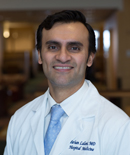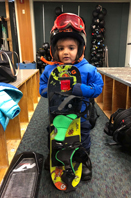Interview with Farhan Lalani, MD
A Conversation with Farhan Lalani, Assistant Clinical Professor
I could not find that you have much of a huge social media presence. Is that intentional?
 That is very deliberate. After being on social media for years and posting my whole life on Facebook and Instagram, I realized that it wasn't adding much to my life or making me happier. In an attempt to pull back from the digital world and be more present in the real world, I scaled back the extent of my social media activity to not posting anything and just following select artists, photographers, actors, athletes, and travelers. My wife and I also tried to imagine how our son might respond in the future to our having posted pictures of him when he had no say in our actions. And, I do not like the idea of Facebook selling my personal information to make money, that doesn't sit well with me.
That is very deliberate. After being on social media for years and posting my whole life on Facebook and Instagram, I realized that it wasn't adding much to my life or making me happier. In an attempt to pull back from the digital world and be more present in the real world, I scaled back the extent of my social media activity to not posting anything and just following select artists, photographers, actors, athletes, and travelers. My wife and I also tried to imagine how our son might respond in the future to our having posted pictures of him when he had no say in our actions. And, I do not like the idea of Facebook selling my personal information to make money, that doesn't sit well with me.
What does your name mean in what language? Does it suit you?
I was born in Pakistan and my name in Arabic means, "happy." It is a common Pakistani name but my Arabic-speaking friends think it is hilarious that someone is named "Happy." And it does suit me.
Where were you born and raised? Tell me about your parents and siblings, and about your hometown? What were you like as a kid?
I was born in Karachi, Pakistan, and we moved to America when I was three. We initially moved to New York and then to Porterville, California, where my mom's sister lived. My dad was an internist in Pakistan and was studying for his USMLE when he developed an astrocytoma. We then moved to Phoenix for his cancer treatment. He passed when I was nine years old, then we moved to Milwaukee where my mom's brother lived. It was there that I learned to snowboard, mountain bike, and made many of the friends that I am still close to today. When I was 15, we moved to Houston where my mom eventually remarried and many of our relatives relocated to Houston be close to one another. As a kid I wasn't really focused on academics, but was mainly concerned with being outside and active. I have a younger brother who works in the oil and gas industry.
When you relocated, what was something about Texas that you particularly missed? And what one thing in California, or San Francisco, did you really take to?
I missed my network in Texas, all of the friends that I've had for twenty years and known for much of my life. The food in Houston cannot be beat—any ethnic food. I've yet to find a city that matches the caliber of ethnic food that Houston offers. And, yet, my favorite food is pizza. My favorite thing about San Francisco is that it is a very cosmopolitan city, but there is still easy access to the outdoors. And it is more beautiful than any city I've ever lived in.
Who did you emulate when you were younger? And who is someone you came to admire later?
When I was younger, I don't think I emulated anybody. But now, I would definitely say my mother and grandmother. They worked really hard and sacrificed a lot for the people around them, and the world is a better place for them having been in it. I think they had a lot to do with my becoming a physician. I try to live by the example that they set for me.
How has "practicing medicine" evolved for you? What is noticeably different than your original ideal?
I think early on I was just trying to learn the things I needed to competently treat disease. As I've progressed in my career, I think I've taken a more holistic approach to medicine. I look at the bigger picture a little more now and focus more on quality of life issues than I used to. For me, personally, practicing medicine is grounding and it influences how I am as a father, husband, and son. Caring for people who are really sick puts your own life into perspective and for me serves as a daily reminder that, no matter what my circumstances, I have it pretty good.
Are there boundaries to Social Medicine? What are its possibilities?
I don't know how to clearly define the boundaries of Social Medicine, but there are many possibilities. I worked for five years in Salt Lake City where the state of Utah had done something fascinating: it defined people who were chronically homeless and gave them housing and social support. And despite the high cost of that intervention, they ended up saving quite a bit of money in reduced ER visits and overall health care costs. The patients also had improved outcomes. We spend more on health care per capita than any country in the world and our outcomes aren't anywhere near the top. There is clearly room for improvement, and I think much of that is in the Social Medicine arena.
Are you more vocal as a person and/or as a physician than maybe you were five years ago?
No. I try to listen more now. When I was younger, I was really fiery, especially about politics, among other things, but over time I've realized that somebody who doesn’t share my viewpoint isn't necessarily wrong and maybe I should do a better job of listening to them. Everything that is going on now makes me crazy, but I can't see past the notion that half of the country has a different viewpoint than mine, and even if I think it's ridiculous, I should listen. I try to remind myself that if I listen only to people who share my viewpoint, I won't learn anything new. Even if you disagree and I do—a lot. At the very least, if you're trying to change somebody's mind about something they feel passionately about, you probably won't be successful unless you hear them out. I'm from Texas and, of all the people I know, I'm definitely one of the most liberal and it's trying at times. At least I've stopped yelling at people.
What is your favorite activity to do with your child? What is a beloved family tradition?
 I spend much of my time with my son trying to indoctrinate him with all of the activities that I enjoy: biking, hiking, snowboarding, and swimming. Hopefully when he is older, we will surf as well. I bought a surfboard, although I haven't quite learned how to do it yet; my attempts at surfing are basically paddling out, almost drowning a bunch of times, then paddling back in. My favorite family tradition is our annual ski trip with all of my cousins.
I spend much of my time with my son trying to indoctrinate him with all of the activities that I enjoy: biking, hiking, snowboarding, and swimming. Hopefully when he is older, we will surf as well. I bought a surfboard, although I haven't quite learned how to do it yet; my attempts at surfing are basically paddling out, almost drowning a bunch of times, then paddling back in. My favorite family tradition is our annual ski trip with all of my cousins.
How have your taste buds changed over the years? What food do you like?
When I was younger, I wanted to be as full as possible for as little money as possible. It was a volume game. Now I am more mindful of what I eat. My favorite restaurant in San Francisco is probably Burma Love in the Mission.
What arts do you follow?
Music. I have so many favorite bands, mostly American. I used to play electric guitar as a kid, but now I play acoustic guitar. I try to play cool songs to my son, but he just wants me to play "Old MacDonald" over and over. I also took a course in Spain about the Spanish artists and loved it. It was just amazing to learn about these historic pieces art and then go see them up close, like Picasso's Guernica. It is still a timely piece, and it is eerie and terrifying that we haven't learned much in 70 years.
- by Oralia Schatzman
View Farhan's professional bio | Go back to interviews
